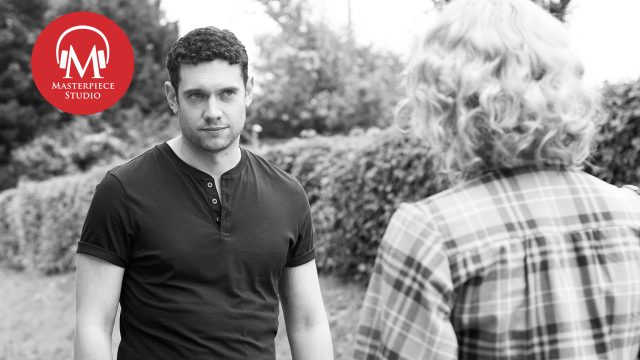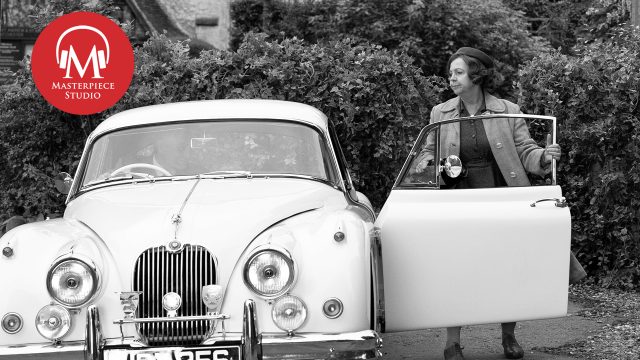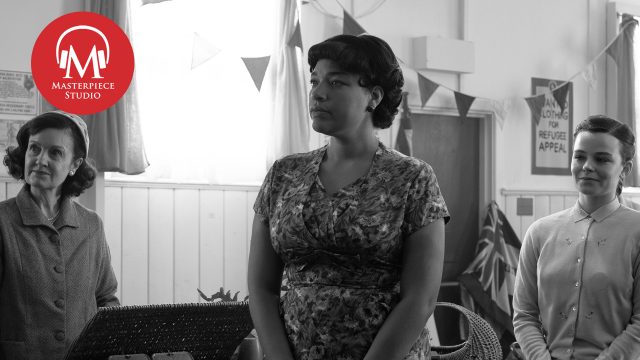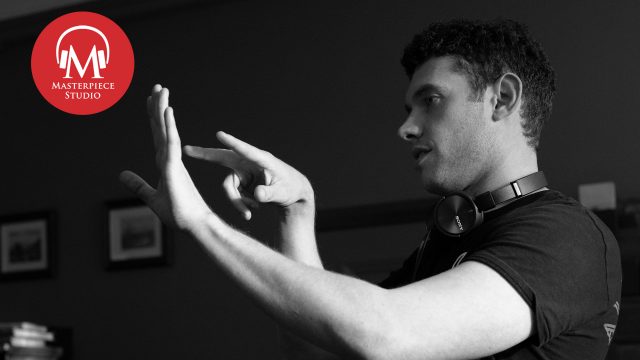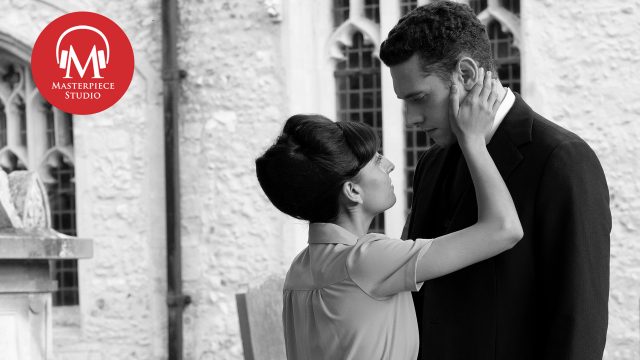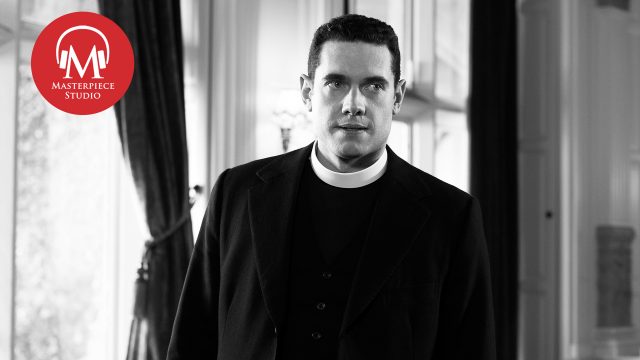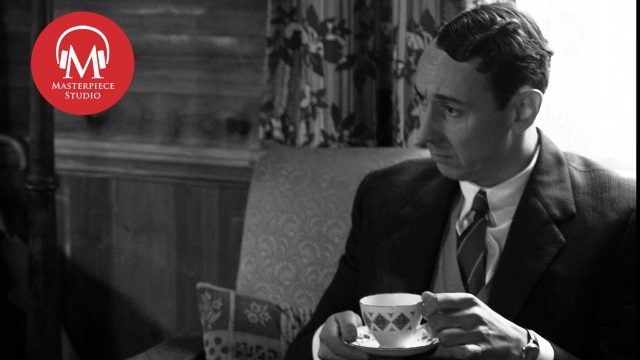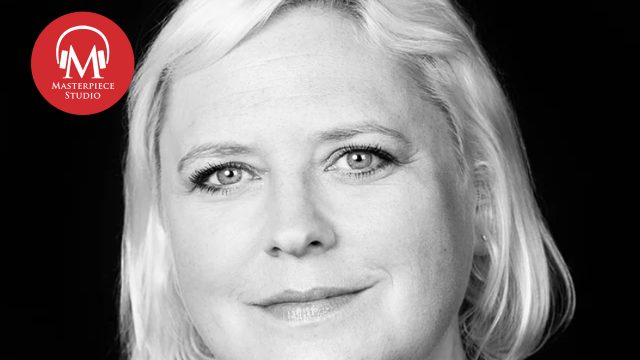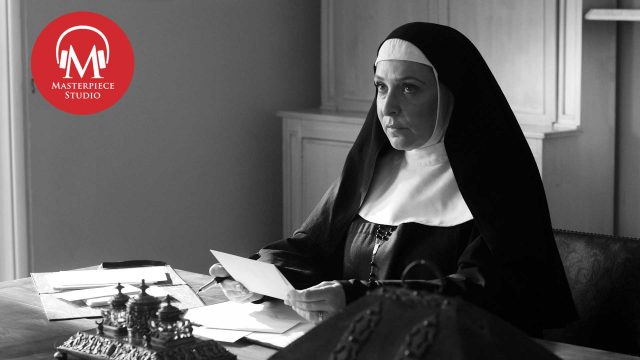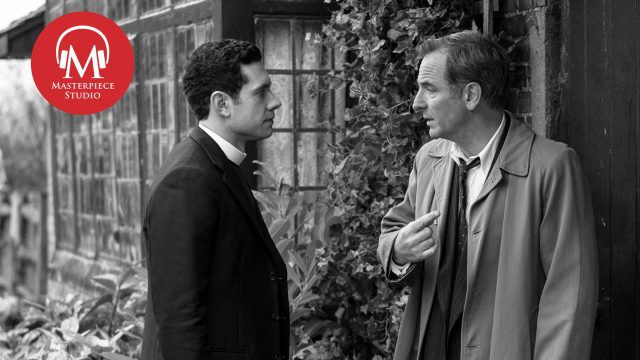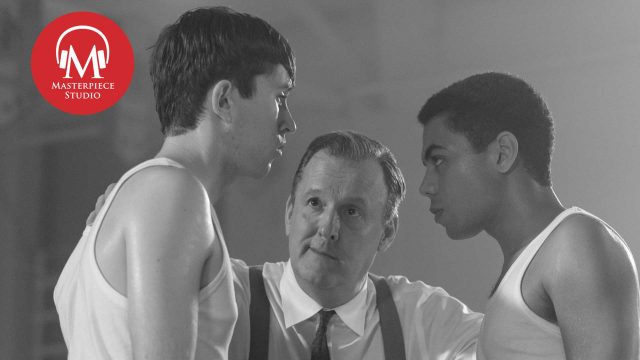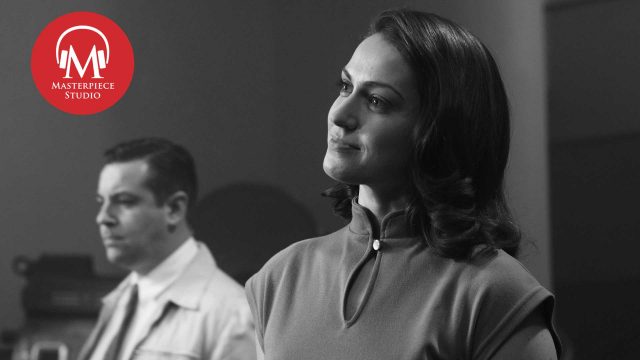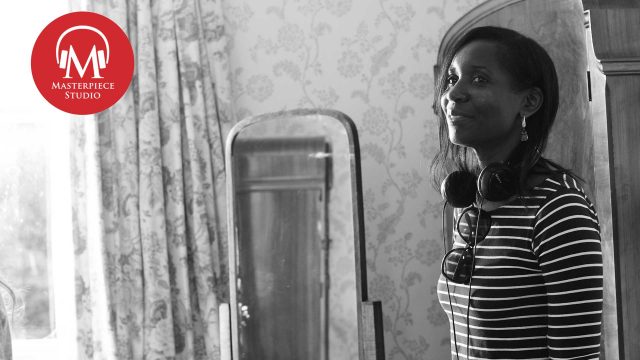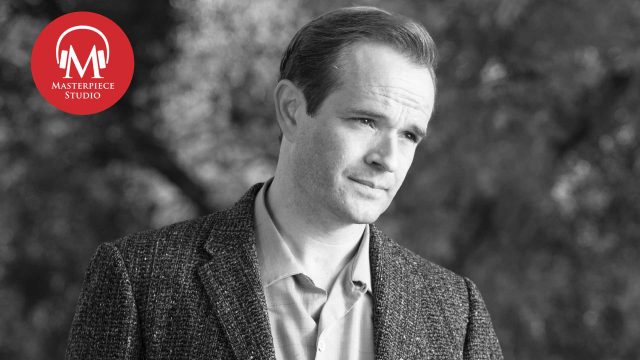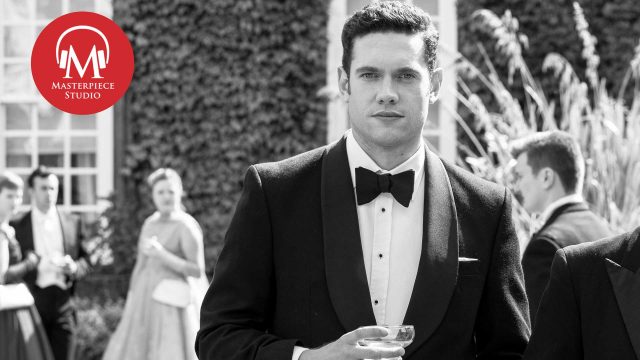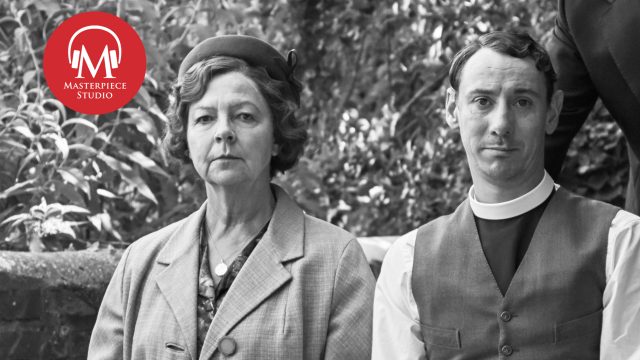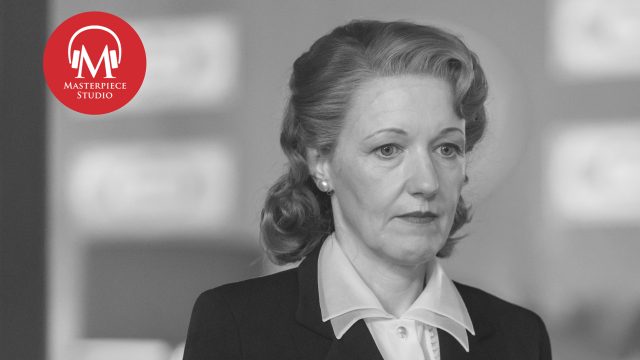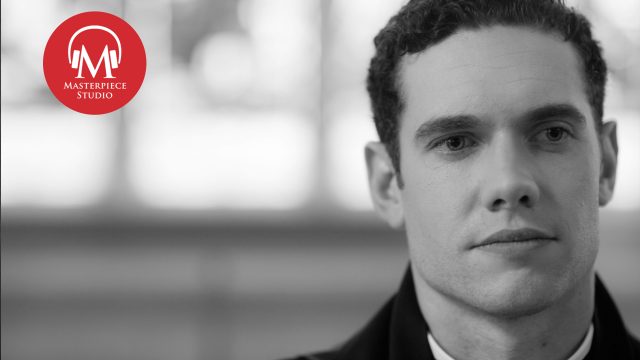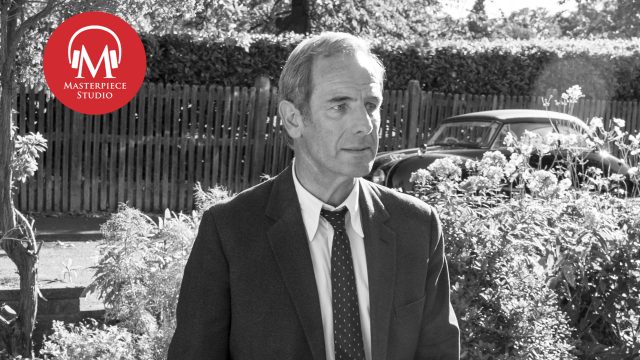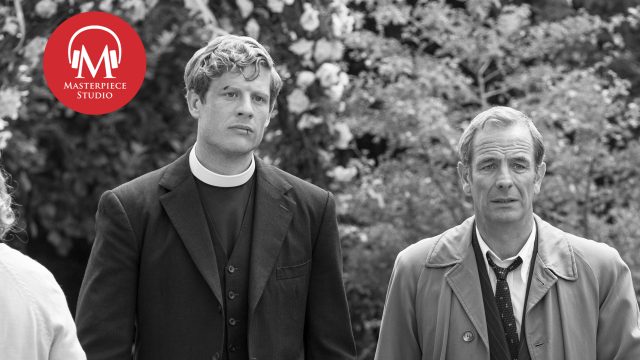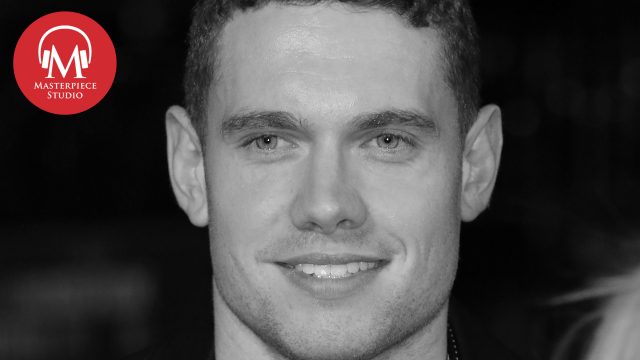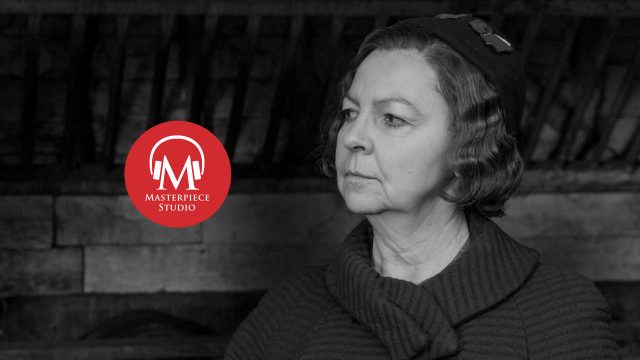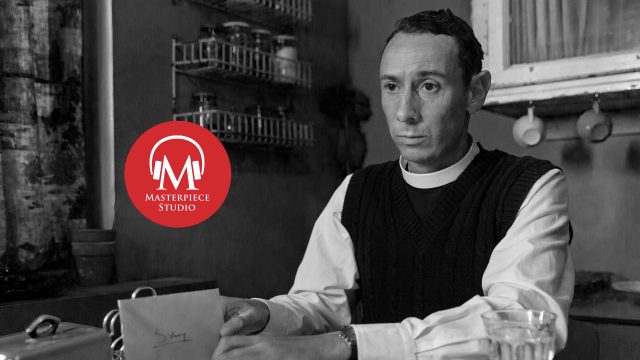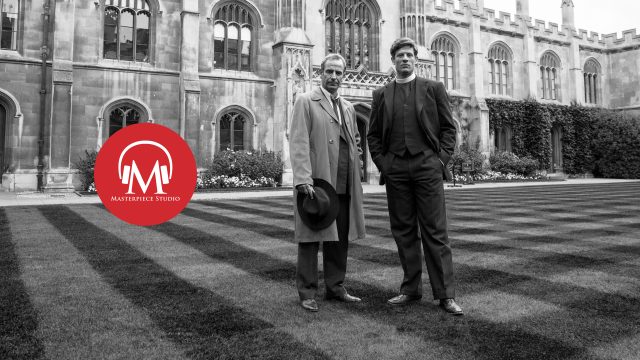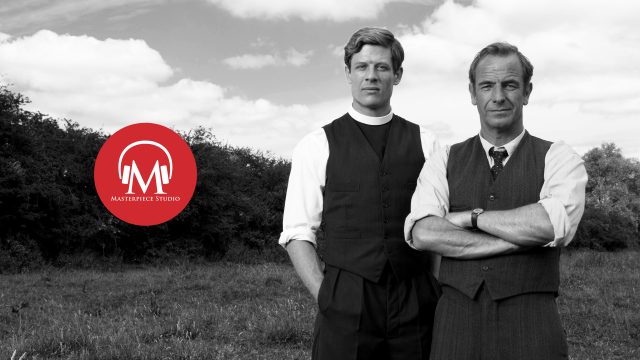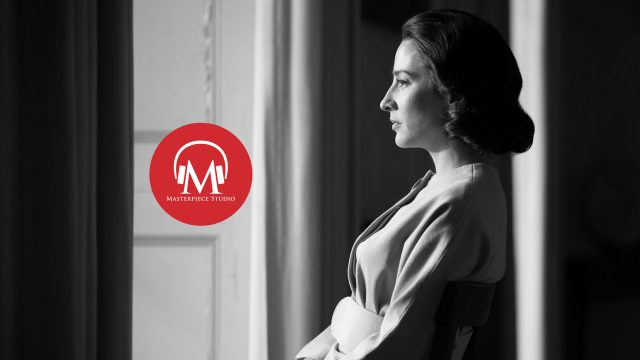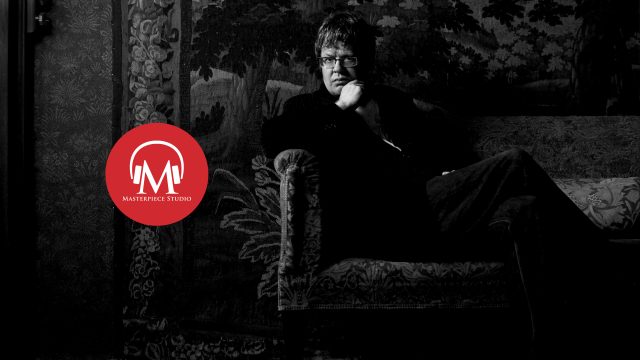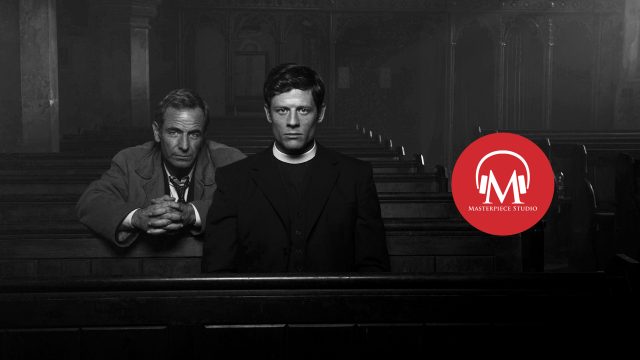The police force in Grantchester is all men — with the notable exception of the sixth season’s bright new regular, the sassy secretary, Miss Scott. Melissa Johns’ snappy assistant can match wits with the best of them, and the actor and disability advocate reveals how she does it in a new conversation.
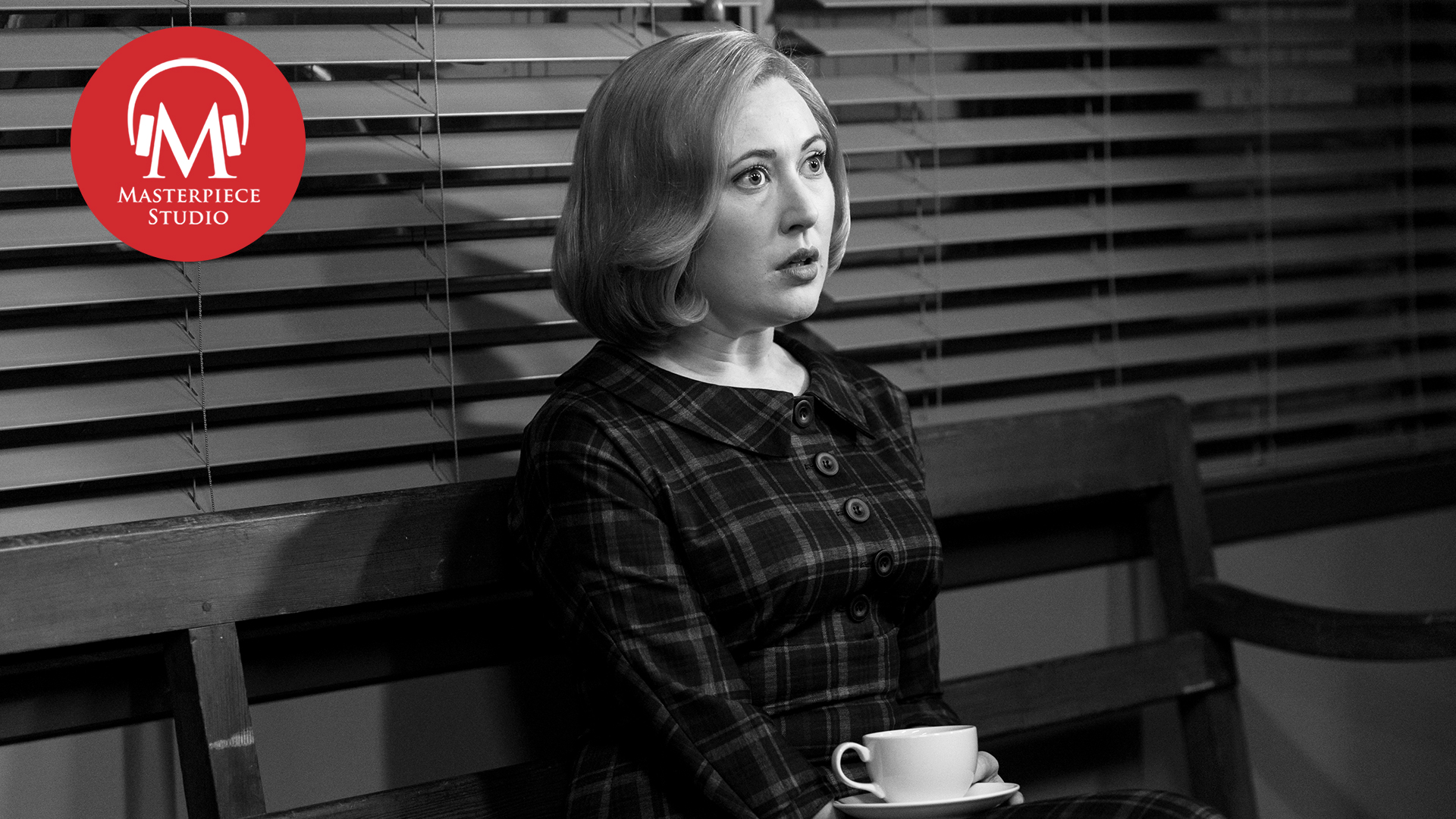

Miss Scott — And Melissa Johns — Bring Charm And Wit In Spades
Released 39:57
Download and subscribe on: iTunes | Spotify| RadioPublic
Transcript
Jace Lacob: I’m Jace Lacob, and you’re listening to MASTERPIECE Studio.
Cambridge-based Detective Inspector Geordie Keating has a way with secretaries. Either he’s secretly having an affair with them on the side — or he has no help at all. That is, of course, until he hires Miss Scott.
CLIP
Miss Scott Inspector Keating.
Larry What you…got?
Miss Scott One for uniform. Trespassers. Down at Tanner’s quarry. Local farmer has seen headlights.
Jace Miss Scott is a modern, no-nonsense career woman, who can’t be bothered to be caught up in her boss’ zany schemes and priest-adjacent, crime solving misadventures.
CLIP
Miss Scott Messages for you Inspector.
Geordie Am I gonna wanna hear them?
Miss Scott I doubt it. The head of college called. He’s had complaints about an officer “harassing” grieving students..
Jace And Miss Scott is a woman on the make, constantly on the hunt for a husband — or a date with a handsome stockbroker — even as suspects roam through nearby jail cells.
CLIP
Miss Scott No sign of a napkin ring. Lady Muck is in the clear.
Geordie Thanks. You can get off for the night.
Miss Scott Oh, the Commander might want a cup of tea when he arrives? Is he very handsome?
Geordie And very married. With a picture-perfect family.
Jace Melissa Johns is herself a woman on the rise, with an original one-woman show set to go on tour and a televised version of that show finally in development. Johns joins us to talk representation, disability and offer a mere hint at Miss Scott’s as-of-yet unknown first name.
Jace And this week we are joined by Grantchester star Melissa Johns. Welcome.
Melissa Johns Hello, Jace, how are you?
Jace I’m good. How are you doing?
Melissa I’m very well, thank you.
Jace So prior to joining the cast of Grantchester, you starred in Mike Bartlett’s Life. You played Imogen Pascoe on Coronation Street, among many other roles, and we’ll talk about those in a bit. But I’m curious how much you knew about Grantchester before going in for the audition. Were you a viewer?
Melissa There is one big thing that I knew about Grantchester and that is that it’s my Nana Pam’s favorite program. My nan is 83, and she and my granddad is no longer with us but they would watch Grantchester. They’ve watched it from the first ever series, and I knew of the show and I knew that it was sort of a very highly respected show, and I knew that it was very much loved by by my Nan. So when I got the call from my agent to say I had an audition for it, I sort of felt this extra pressure because, ‘This is my nan’s favorite show!’ But I’ll be honest. You know, I’m a disabled actor. I was born without my right hand and forearm. And so I really didn’t have much expectation in terms of getting the parts because actually for disabled actors, there’s still quite a huge fight around us being seen in period dramas. Obviously, you know, there is a real conflict between disability and history and how we were treated and how we were seen. So I’ll be really honest, I was not expecting it at all. And when my agent phoned to say that I was being cast as Miss Scott, I absolutely couldn’t believe it. I actually swore on the phone to her, which I don’t do very often, and I the first person I called was, of course, my Nana Pam. And I said, ‘Nan, you’re not going to believe it. I’ve been cast in Grantchester six,’ and she cried her eyes out, and she said, ‘If only your grandad could hear you now.’ And, and she was just she still is just so, so happy about it. She says that when she was in her 20s, she was also a Miss Scott because she was a secretary in a in an office, and she has just loved every minute of it. So I knew Grantchester was brilliant and highly respected, but I knew more than anything was that this was going to be a show that my Nana Pam was going to be very proud of.
Jace So this so this Nana Pam’s favorite show. Corey was your late grandfather’s favorite show. Are you only doing shows that your grandparents loved? Is that is that the goal here?
Melissa It would seem that, wouldn’t it? I really wish that, you know, they would love things like with the next James Bond film, and then maybe I could get cast in those as well. That would be nice, wouldn’t it, if that’s what the universe is doing following their favorite list? But yes, they thankfully they like some. They like some good shows, and Grantchester is is, of course, is, of course, one of them. But yeah, I think this industry, we love what we do. But my gosh, if you can make your family proud, there’s nothing that compares to it. Is there?
Jace Oh, I mean, Miss Scott’s first appearance in episode two of series six has her described in the script as, ‘Smart and capable.’
CLIP
Geordie Night Miss Scott.
Miss Scott Not yet I’m afraid Inspector. Boy Wonder has put up the Bat Signal.
Geordie What, Larry? You wanna stop reading those children’s comics.
Jace To me, she quickly becomes sort of unflappable and pithy an underpaid wonder, as she puts it. What did you make of the character when you first read for her?
Melissa So when I first read the script and had a little look into it, Miss Scott, again, I really did think, ‘Oh my gosh, I have yet to have seen somebody who maybe has the same body as me in a role like this,’ and that does come into play slightly, because you when you’ve never seen something, you sort of get this excitement actually that maybe this could be, you can put your mark on it. And so straightaway, I thought, ‘I love that this has got nothing to do with disability. This is just a quite feisty, strong-willed, very determined, very organized woman who works in a very male dominated world.’ You know, she’s pretty much the only woman in the police station, and she absolutely uses that to her advantage. And I loved that, because it wasn’t about her being pretty or sexy, or, you know, she absolutely, as we’ve seen, loves to have a flirt. She loves to go on dates. She actually isn’t bothered at all about getting married, but there’s nothing about this that is just about visuals. I think from the off, you can see that this is a woman that is very good at her job, and she knows what she wants and how she can get it. And I sort of, I love that in a character.
Jace I mean, as you say, it is rare, particularly in period dramas to have an actor with a limb difference or a disability, full stop. True representation in media comes when a viewer says, ‘That person looks just like me.’ I mean, does Miss Scott feel like a trailblazer in that respect, depicting a disabled woman in 1958, specifically? We don’t see that.
Melissa We absolutely don’t see that. And oh my gosh, it is a mold that I am along with lots of other incredible actors, so, so, so striving to to break because disability and people with limb differences specifically didn’t just start being born a few years ago. We’ve been around forever. We just sadly choose to maybe tell the stories not of those people, or we just assume that maybe they were locked up or weren’t around or. And that’s just not that’s not the case, sadly, is the case that for some in some areas, actually, but on a whole, this is something that’s just because we’ve never seen it. It didn’t mean it didn’t happen. And I just think. I think there’s two things here, I think that disability should be celebrated in its own right, so we should absolutely be commissioning and and and and showing those stories where, of disabled people that were trailblazers and did change the world, but also when it’s coincidental, it doesn’t have to be part of it. And the real beauty comes from when actually you just have a show like Grantchester, where it just so happens that Miss Scott has got one and a half arms, depending on whether you’re a glass half full person, one arm, one and a half, how many, you know, that’s it. That’s when the real change starts to happen because it’s not mentioned anywhere. And so viewers start to question how much it does really matter if somebody looks different to somebody else, and that’s where real change starts.
Jace So visual representation can be seismic, or groundbreaking in and of itself.
Melissa I absolutely think so. When I was on Coronation Street, I had lots of people that would get hold of me and say that their granddaughter or their grandson, their child, their friend had seen me. And what that did to their confidence and one story sticks with me hugely. It was a lady whose granddaughter was getting to an age, I think she was about 10 or 11, and I remember 10 and 11 very well. I absolutely loathed this body that I had. I’ve just written a one woman show which is going on tour in the UK in spring, and it very much depicts this idea of body image and disability, because when you have a body difference, you spend so much time making sure that everybody else around you is okay with the way you look. You never get a chance to find out how you feel about the way you look. No one ever asks you how you feel about the body you’ve been given. And so for me, growing up as a teenager, in my early 20s, that led to really sort of dark times because I just, I just didn’t understand why my body was so different to everybody else, and that meant I really didn’t like it very much. And so to hear this woman say that her granddaughter had walked into the living room when I was on TV, when I was on Coronation Street, and she had noticed that for the last few months, she’d been hiding her arm behind her back and on I used to do this as well. Really hiding it behind your right hip so people can’t see it. And she said her eyes just lit up, the minute that she saw me with this identical arm as her on the screen and she almost like involuntary, just like shot her arm up in the air and said ‘That girl looks like me!’ And I can’t I can’t express what that’s like when you feel free enough to get a part of your body out that you often hide away. It seems like quite a little thing, but actually, to hide away a whole part of you is quite a big thing. And when something happens that pushes you to just, to just get it out there and feel the freedom to let the world see it, it’s a life-changing feeling, and I’m certainly not saying that I’m able to change it, change anyone’s life. But if I can be part of a world that allows our next generation of young people to see themselves, then that can only ever be a good thing.
Jace I mean, you touched on that in the short film you did for the BBC entitled What Would You Do, Frida? What was that experience like using Frida Kahlo as a way of exploring Tilly’s story of exposure and difference and in fact, your own?
Melissa I just thought that that was a real parallel here, again, showing women of history that are disabled, that were disabled and how we can really look at those parallels between that and today’s society. I know that there have been a few portrayals of Frida Kahlo where non-disabled actors have been used, and it’s just a bit of a waste, because when you cast a disabled actor in a non-disabled role that what comes with that is is incredible. And I know there is an argument that often floats around that says, ‘Oh my gosh, it’s only acting, for God’s sake, is a policeman meant to be played by a real policeman?’ I’ve had them all thrown at me, you know, I’ve had ‘Paddington should be played by a real bear, should he?’ or ‘Should a dead body really be played by a dead body?’ And I always, my response is always the same. ‘I think it’s really heartbreaking that we live in a world where we compare a disabled actor to a dead body or a bear.’ ‘No, we can’t use a real bear for Paddington, because the animal rights would really have something to say about that, rightly so. We can’t use dead bodies because that would be against the law, and we already don’t have enough police on our streets. So no, let’s not use real policemen. But disabled actors do exist. We are here, and so many of us are trained and have grafted throughout our careers so far. So why not use us and the lived experience that we’ve got? And maybe when we get to a point where we’re playing the non-disabled characters, maybe we won’t be so annoyed when non-disabled actors play disabled roles?’ Does that make sense?
Jace It does make sense. Yeah.
Melissa You know, that’s I think that’s what it’s about. I think if we can get to a world where actually we’re given all the roles as well, then we we won’t mind as much when a non-disabled actor plays, plays a disabled role. And so for me, I wanted to really highlight that Frida Kahlo was somebody with lived experience of disability and the parallel between that and modern, modern society. And also just looking again at that, that idea of. How we feel about our bodies when we’re growing up, I don’t think you have to have a disability or a body difference to have a part of your body that maybe you’ve struggled to accept. Maybe you know exactly how to sit, how to stand, how to look in photos, what to wear, how to hold yourself on dates. You know, we are absolute masters of manipulation when it comes to our bodies. And quite often, other people won’t even realize that there is something about your body that maybe you don’t like. But it’s so important for us to have that conversation because, I know it’s very cliché and a little bit, you know, Instagram-quote worthy, but the beauty of this world really does come in our difference, doesn’t it? And I think that TV and film in the media in general really does have a responsibility and a lovely responsibility. I think it’s a gorgeous responsibility to have to be able to show properly the world that we live in, and I think out of all the responsibilities you could have in the industries we’ve got in this world, that’s a really nice one to have.
Jace As you say, Miss Scott was not written as a disabled character. Does it change your perception of the character coming in? Do you work with the producers to sort of, push a direction of the character? Or is it just again, this is just about visual representation, and I’m going to play Miss Scott as a disabled person?
Melissa Absolutely, I think with this one, there are certain characters that I take on that I really have to think, ‘OK, I know physically and visually people will see me as disabled because I am,’ and, you know, I don’t shy away from the word disabled. I think we’ve been taught for quite a while that disabled is a dirty word, and it’s it’s really not like most of us really embrace it because it’s, you know, our lived experience. But I really have to think when I take on a character, is this something that I’m really going to lean into? Is that a bit of the back story there? Did something happen? And for me, you know, I did have I did think about what might have gone on. We had a war that happened before this. Where would my character have been when that whole happened? Is there any way that something could have happened to them and it never has to come out? It’s more just kind of for me, I guess, but for Miss Scott…she is so well-written that actually, I just think her personality and her relationship with Jordy and her relationship with Larry and and her relationship with that police station…unless there’s a real need for it, it just has never needed to be spoken about, and I just loved that the producers on Grantchester were just so there wasn’t any feeling that they were ignoring this at all. But that was also there was a feeling that there was no need for them to have to make a big thing out of it. And it’s one of the first shows that I’ve been in where I’ve really felt that the balance was just perfect. They weren’t ignoring that my body is different to anybody else’s, and they didn’t feel the pressure to highlight it. They just knew that they had written a really strong character in terms of a woman in the ’50s that knows what she wants and is good at her job, that that was what mattered to them the most. And as an actor taking on a character like that, that’s all that mattered to me. So I have huge praise for the Grantchester producers for those decisions.
Jace Before this next question, a brief word from our sponsors…
Jace There is an aura of mystery to mystery to Miss Scott. Spoiler: we still don’t even know her given name by the time series six comes to a close, which I love. We know it is not Dot Scott, or Philippa. That is all we know. We don’t get much of Miss Scott outside the police station, though we’re given little glimpses into her life away from work.
CLIP
Miss Scott Hands palms down, feet well apart.
Tamara Thank you. I know the routine.
Miss Scott Yes, you look like you’ve been around the block. And you…a vicar’s sister.
Tamara Stepsister. It’s a completely different gene pool. Wouldn’t be illegal, if that’s what you’re asking.
Miss Scott It wasn’t.
Tamara Where did they dredge you up from, anyway? Is your husband a policeman?
Miss Scott Don’t have a husband. I have a job. In this place.
Tamara Oh really? Is it very exciting?
Miss Scott Not really. Although earlier, I did serve a cup of tea to a dead man.
Jace Why do you feel she’s taken this job at this point in her life? Why is she here?
Melissa I think that Miss Scott — I think that for her, there’s a real if it can be a humble sense, a humble sense of, ‘I know my own self-worth,’ and I feel like she’s a character that was probably told, ‘Of course, you’re not going to be able to work in a police station or if you are, you’ll just be sat behind a typewriter.’ And of course, Miss Scott absolutely took that job on because she was only meant to sit behind a typewriter. But that’s just that was never going to happen because she knew that I think she needed to sort of bide her time, but she absolutely knew that she had the right skills to be able to drop hints, when they were needed, that she would be able to support on things that would happen within a police station. And I honestly think that she would have gone into a job like that, knowing that it was a bit of a long game and that actually, yes, she would get the job based on her typing and her answering phones and her organizational skills. But it was only a matter of time before she would start to get listened to because she would make sure that she went above and beyond and her efficiency wouldn’t go unnoticed. And I obviously, you know, we haven’t long finished filming series seven, but I think Miss Scott really shows early on that actually she is so much more than the job she first took on. Even though, you know, she does make a lovely cup of tea, and Geordie takes full advantage of her cups of tea and she does look after him, and she will make sure that he’s got an ironed shirt. She’s doing all the things that you know, she knows she has to do. But I think Miss Scott’s playing the long game and she knows her own. She knows her self-worth. She knows she knows what she should be doing.
Jace You mentioned Larry earlier. Rather tragically, we don’t get a clue as to what happened that night with Miss Scott and Boy Wonder, Larry, though Miss Scott derided going to the pictures as rather unimaginative. Do you feel she ended up going through with the date with Larry? Did that happen in your mind?
Melissa So firstly, Bradley Hall, who plays Larry, is just not only a fantastic actor, but just one of the best human beings on this planet. But yes, I think it became really apparent to me quite early on that Miss Scott’s personality and Larry’s personality were very, very different. And I just thought, ‘My gosh, I don’t know how this is going to work because I honestly think Miss Scott’s going to eat Larry alive.’ He’s just, he means well, and it doesn’t always come out that way. But I think it’s quite obvious that Miss Scott needs somebody that is absolutely going…because she’s so ahead of the game and slightly ahead of her time, she also needs someone that’s ahead of their time that is going to completely sweep her off their feet. And I think they’re quite hard feet to be swept off. And so it was always apparent to me that maybe Larry wasn’t quite the right person, so I wasn’t sure that the date would ever quite go ahead. I think she probably enjoys the attention, and she knows that she’s going to get it for a bit longer. But yeah, I think she’s probably a bit of a game player. We know she loves dating. She’s a serial dater.
Jace I mean, she blows off a date with a handsome insurance broker when an American in uniform shows up, she asks whether the commander is attractive. And then there’s Larry. You know, she’s definitely on the hunt. I feel like she’s looking for a baronet who can take care of her.
Melissa And she clearly has no loyalty whatsoever. She is ready to drop them just like that, isn’t she? But yes, absolutely. I don’t think she feels responsible for a man’s feelings. I don’t think she feels indebted to a man. I think that she puts herself first very much, and again, she knows what she likes and she knows what she wants.
Jace I mean, it shouldn’t feel significant that a disabled character is depicted as romantically available, but the entertainment industry really wants to focus on the sex lives of disabled individuals and your pregnant character. Hannah was at the center of a love triangle in life. Does it feel like the tide may be changing on that front, that this is ground that the entertainment industry is willing to explore?
Melissa Absolutely. And we are so here for that conversation. I that that’s another thing that my one woman show Snatched really depicts is the, you know, very taboo subject of sex and disability, or sex, and having a romantic life. And it still really baffles me that in 2021, we’re still having this conversation, but it is still happening. I remember when I went to drama school in London and when I was 19, a girl asked me, I was on the phone to my boyfriend at the time and I said goodbye to him on the phone and I said, ‘Love you’ and I put the phone down. And she said, ‘Oh, who was that?’ And I said,’ Oh, it was my boyfriend.’ And she said, ‘Oh, you’ve got a boyfriend?’ And I said, ‘Yeah, I know. Can you believe it?’ And she said, ‘Oh, OK, I mean, how does he feel about the way you look?’ And I said, ‘I think he’s I mean, I mean, I’m guessing he’s fine with it. It’s never really bought it.’ And then she says, ‘But how does he feel, and how do you have how do you have sex?’ And I remember thinking, ‘Firstly, are you doing it right? Are you sure? Do you need me to help you out and do a diagram? Because if you think you need both hands, then you might be doing it wrong, my love.’ But it really did highlight that there are still a lot of people that walk around in this world assuming that we are unwanted and we are incapable of having relationships. And I think the sooner we can start tackling more of those stories, I was fortunate enough, as you say, in life, to be able to portray Hannah, who was in the love triangle with Andy and Liam, and pregnant. You know, it was lovely to be able to show disabled women having babies, which is perfectly normal. But yeah, I think with Miss Scott, it was just another part of her that I loved. For the producers, it just didn’t matter that she has this little limb difference. There’s no part of Miss Scott that questions her own beauty or her own sexiness or her own attractiveness. She doesn’t question it one bit. And that, for me, was incredibly empowering to play, and almost like a reminder to myself because however much I’ve moved on and I’m far different from the teenager or the girl in her early 20s who sort of, you know, despised her body and was worried about what men would think, and all of that, however much I’ve moved on from that. of course, you still get days where you know you have wobbles, and I think, my gosh, Miss Scott absolutely reminded me of how you can continually channel your beauty and your attractiveness and how sexy you feel and actually having a limb difference really doesn’t come into it one bit.
Jace So her given name is ‘No wobbles,’ then. Miss No Wobbles Scott. She doesn’t ever wobble. I mean, she’s so self-assured, and she brings such a distinct voice to this show, which is a sort of murder mystery morality show. But she brings this wry sense of humor to the series. I love the scene in episode four, there’s there’s a complete clash of cultures when Miss Scott has to search Will’s half-sister Tamara, and we get a true glimpse of Miss Scott’s mettle, when faced with Tamara’s rapier-like wit, she gives just as good as she get, Miss Scott. What did you make of that scene with Emily Patrick at the police station where Miss Scott has to search her?
Melissa It was such a lovely scene to film with Emily because, you know, the show is very male heavy. Of course it is. It’s, you know, you only have to look at the time period for that to be spot on. And at the same time, that was really lovely to be in a scene with just two women who were able to have an empowered conversation about, I mean, they are both two women that know exactly what they want and we really get that. And so I think the content of a scene like that is just as important as the fact that this was two women in a 1950s drama having these conversations. But yes, two quite fierce and driven and determined women coming up against each other whilst one of them is actually having to be bent over a table whilst the other one searches her. And I think that absolute juxtaposition was just so lovely for us to play, because there was this sort of empowered element of cattiness. It wasn’t like, it wasn’t like, ‘Oh, look, here we are two women. Of course, they’re going to be catty or bitchy or anything like that.’ But it was two women that were just both standing up for themselves in that moment whilst also knowing exactly what they had to do. You know, Tamara had to live by the rules and get searched and Miss Scott still had to do her job and search the person. But I think you got that real sense of them both carrying out their duties of exactly what they had to do whilst feeling so empowered to be as, as snappy and as fierce as they needed to be.
Jace I love that scene. What does Miss Scott make of Will and Geordie’s rather unusual partnership? It doesn’t seem like it’s something she would have come across in secretarial college.
Melissa Absolutely not. You know, the Vicar and the Detective, it’s just brilliant and it remains brilliant. I think that for Miss Scott, you know, whilst I said earlier that maybe she’s not as loyal, I do think that that is only as far as dating goes. I think that’s, you know, she can kind of have maybe fickle relationships with men. But actually, she has a real, real loyalty to Geordie. There is not an element of it that is a romantic relationship between them. And I knew that right from the start. The minute that I got to read the scripts, I just loved that, I think there’s so many times where we see things and we think, ‘Oh gosh, is that about to get a bit romantic? Is that going to happen? Is that going to happen?’ And actually, I just knew all the way through that that was never going to happen between Geordie and Miss Scott, because that’s not the relationship that’s set up. There’s a real friendship there, actually, and there’s a lot of banter. I think what I love most about Geordie and Miss Scott is the fact that they really, really tease each other and they feel comfortable enough to do that. Whilst she pushes her place, she knows where her place is within the police station because I think, as I say, she knows that going above her station isn’t going to get her where she wants to be, so she very much sticks to the rules. But she will stand on those boundary lines as much as she can, especially with the teasing and the banter she has with Geordie. And she looks after him actually, she’s genuinely, genuinely concerned about his welfare and he means a lot to her. And I think whilst she’s not, she doesn’t have that relationship with, Will, she knows that she absolutely respects the relationship between Geordie and Will because she knows that Will means so much to Geordie, but Miss Scott’s loyalty is 100 percent to Geordie.
Jace Snatched had a tech rehearsal about 18 months ago before the entire world shut down amid the pandemic. You finally got to do a private industry showing. What is it finally like having an audience see Snatched?
Melissa Oh my god, Jace. It was incredible, and the reason I’m beaming is because it was only a couple of weeks ago ,and it was amazing. We started devising Snatched and and I wrote it from off the back of devising process between myself and the director. And this had been In the making for so long, and then we got hit by COVID. In the night, as you say, we were in a tech rehearsal and the show was about to go up the next night. This was in a theater in Newcastle, and my mum called me and she said, ‘I think they’re closing theaters,’ and I said, ‘No, they’re not. We would have heard about it already.’ We went into the rehearsal room and the artistic director of the theater came in and he said, ‘I’m so sorry. We’ve just had the call that all UK theaters are closing tonight. The show’s not going to go on.’ And it was just such a strange, strange feeling. And then we were about to do it a second time and things lifted again slightly. And then, no, actually theaters weren’t going to open again. So we really had gone on a roller coaster with it. And so a couple of weeks ago, Friday, the 17th of September, I think it was, we invited 70 industry guests and 68 people turned up. I couldn’t believe it,
Jace Wow.
Melissa When you’re doing an industry show, you don’t expect all 70 to be there. So to get 68, I was absolutely beaming. And it just couldn’t have gone any better. I always wanted Snatched, I want an audience that sees Snatched to go on this absolute emotional rollercoaster that’s filled with ‘90s nostalgia. I’m a child of the ‘90s and the noughties, and that’s very apparent throughout the whole show. But I I. I wanted to do the show originally, the cherry on the cake was that, well, the back story is as I’ve said it, it looks at body dysmorphia and disability and body difference, but also it’s fairly universal in the sense that you don’t have to have a clear body difference or disability to understand the feelings that you feel about body image. But what it’s like to grow up with a very different body to everybody else around you in the situations that I would, I would get into right the way from, you know, childhood to teen years and this body that I loathed and I didn’t want anyone to say. And then what happens when you end up being cast in one of the UK’s biggest soap dramas, Coronation Street…and about six months after I was cast in Coronation Street, my iPhone got hacked and I had explicit and intimate photos hacked, and they were put online and the papers got hold of it. And suddenly, this body that I had despised and loathed and hid away was now accessible to the entire world. And the feelings that had to come with that. And so the show really, Snatched is the name of the show, and it really explores everything underneath that, actually. I always knew that I never wanted the photos to be the main point of this. The photos were just the thing that actually made me realize that I deserved to give myself a better life and that I needed to stop hiding away, because I was just draining myself, by not liking this skin that I was in. And one of the things that ended up making me change was my granddad, Frank, he is no longer with us. He was the Coronation Street fan and Grantchester fan. He got a a video camera. The year I was born in 1990, and he documented my entire life pretty much. I can’t think why I wanted to be an actor.
Jace Not at all.
Melissa No, no idea why. But I was able to watch some childhood footage. And I remember just watching this footage of me as a child and seeing this little girl dancing. I used to love dancing so much and I’m there and I’m twirling and I’m doing ballet and I’m doing the locomotion and Saturday night and all of these things that require two arms, like the macarena. And I’m not caring one bit. And all of those things led up to this absolute pinnacle where I just thought the same as everybody else, that little girl still very much lives inside me, and when she was that age, she thought she was going to have the best life. And so who am I to not give her that best life? And so this combination of reading what had been written about me the way that my precious body had been depicted by people online, reading that and then watching this little girl, she was free and danced and and just loved her body. How could I not give her the life that she deserved? And that was when I decided to turn the whole thing around, and we ended up releasing the entire story ourselves so that I could have advocacy over how I wanted it to be told. I very much went on a path of not only body acceptance, but absolute body celebration. So I’m not saying that it was a good thing that it happened to me, but I think we do not have control over anything that happens to us in this life that the one thing you do have control over is our freedom of response. And watching the footage of that little girl just absolutely gave me the empowerment to respond in the way that I did. And Snatched depicts all of that. At the same time as being a comedy. It’s a comedy. It really is! I think the best way to combat any of those things is to write it with comedy. We had a quote come through recently for the show, after the industry came to it and someone said, ‘I couldn’t believe that I could laugh one minute and within five seconds be in tears,’ and not that I wanted to emotionally manipulate people, but that’s it really, really, really nice feeling.
Jace You’re back in series seven of Grantchester. Snatched is beginning a UK tour in May 2022 two. What’s next for you?
Melissa So I am currently starting to write the TV version of Snatched, as well. I’d been approached by a few different people that planted the seed in my head, and so that’s the next step where we’ll be doing the UK tour and at the same time, having meetings with producers for the TV drama version of Snatched, which is really exciting. Grantchester has been fantastic. But yeah, I think I’m very fortunate to be in a position where I’m able to do two things. I’m able to be in this wonderful industry that I do not take for granted at all because I know that it can end any moment, and I’m so grateful for the work that I have done and that I get to do. And at the same time, I know that when I do get a job, it’s so much more than just me getting a job. When you’ve been fighting for equality and representation for so long, when you do get a role it, it’s so much more than just you. Of course, it’s lovely. It feels great. You know, my agent calls me and I get to have that wonderful buzz and I get to call my family and get the buzz again. But then you get the other things that happen, which is an entire generation of young people seeing that not everyone looks the same. And I think it’s an absolute honor that I’m able to do that. I feel very, very, very lucky. I’m a very lucky girl.
Jace Melissa Johns, thank you so very much.
Melissa You are so welcome, Jace, lovely to talk to you.
Jace While this podcast is reaching your ears with two more episodes remaining in this sixth season of Grantchester, we’ll next check in after the surprising season finale.
CLIP
Geordie I just needed…
Will You don’t ever raise your hand to Cathy!
Geordie I never touched her!
Will You shouldn’t have even come close!
Jace Series creator and executive producer Daisy Coulam — and series lead Tom Brittney — join us on the podcast, November 21.
MASTERPIECE Studio is hosted by me, Jace Lacob, and produced by Nick Andersen. Elisheba Ittoop is our editor. The executive producer of MASTERPIECE is Susanne Simpson.
Grantchester Podcasts 30 More Podcasts
MASTERPIECE Newsletter
Sign up to get the latest news on your favorite dramas and mysteries, as well as exclusive content, video, sweepstakes and more.











